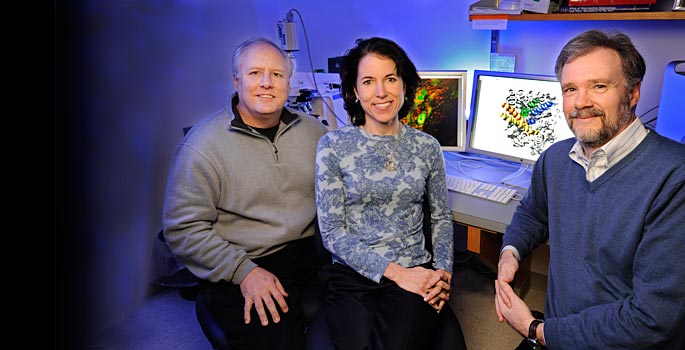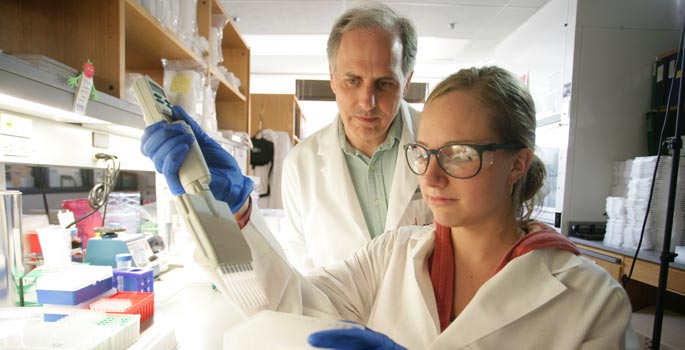Featured Research
-

Elephants can transmit TB to humans
Elephants can transmit TB to humans, researchers at the CDC, Tennessee Department of Health and Vanderbilt University have reported. Read MoreMar 11, 2011
-

Exercise can curb marijuana use and cravings
Just a few sessions on the treadmill can prevent marijuana cravings and use, new research finds. Read MoreMar 4, 2011
-

Campaign spending’s clear winner: Corporations
Researchers discover corporations gain clear financial benefits when individual employees make political donations. Read MoreMar 2, 2011
-

Identification of glaucoma gene brightens future for therapies
Researchers have identified a new candidate gene for the most common form of glaucoma, which runs in families. The findings offer novel insights into glaucoma pathology and could lead to targeted treatment strategies. Read MoreFeb 24, 2011
-

Tennessee pre-k students see 82 percent gain over peers
Students in Tennessee's state prekindergarten program experience an average of 82 percent greater gains in literacy and math skills over their peers who do not attend state pre-k. Read MoreFeb 24, 2011
-

‘Glass ceiling’ exists for women surgeons
Less than a third of surgeons who advance to senior ranks in the U.S. are women, and it's not because they're less qualified or less productive than their male counterparts, new research finds. Read MoreFeb 21, 2011
-

New model to test how antidepressants work
A new mouse model offers the ability to better test how selective serotonin reuptake inhibitors (SSRIs) work and could lead to the development of new classes of anti-depressants. Read MoreFeb 18, 2011
-

The Invisible Line: American families’ journeys from black to white
African Americans have continually crossed the color line and assimilated into white communities since the 17th century, without science or surgery. A new book reveals how, and why. Read MoreFeb 17, 2011
-

Vanderbilt-pioneered fetal surgery procedure yields positive results
Results of a landmark, seven-year National Institutes of Health-funded trial, Management of Myelomeningocele Study (MOMS), demonstrate clear benefit for babies who undergo fetal surgery to treat spina bifida, the most common birth defect in the central nervous system. Read MoreFeb 9, 2011
-

Improving heart patients’ outcomes goal of nursing study
(iStock photo) Vanderbilt University Medical Center is participating in a multi-site, national study to identify the role nurses play in improving outcomes among heart failure patients. Nancy Wells (Vanderbilt) “Heart failure is being recognized as a huge issue in elderly and middle-aged people, and it has a profound effect on… Read MoreFeb 9, 2011
-

What fourth-down decisions in pro football tell us about deadlines and risky decision making
Try asking any Monday morning quarterback about blown fourth-down play calls in the NFL and you are guaranteed passionate opinions. In most fourth-down plays, an NFL team will punt or try for a field goal. But, occasionally, teams decide to do something that is viewed as risky – attempt a… Read MoreFeb 2, 2011
-

Going underground in search of new drugs
Every few months, chemist Brian Bachmann sheds his white lab coat, collects his flashlight, helmet, surgical gloves and knotted rope, puts on old clothes and hiking boots and heads to a nearby cave. Bachmann, an assistant professor of chemistry at Vanderbilt, has combined his industrial experience in… Read MoreFeb 1, 2011
-

Vanderbilt joins consortium to discover and map all Alzheimer’s genes
Jonathan Haines and his colleagues at Vanderbilt are part of a global collaboration to discover and map all genes relating to Alzheimer's disease. (Daniel Dubois / Vanderbilt University) Researchers at Vanderbilt University Medical Center, and across the globe, announced today a multi-national collaboration to discover and map all genes relating… Read MoreFeb 1, 2011
-

Tuning graphene film so it sheds water
Physicist James Dickerson, left, and graduate student Saad Hasan (Photo by Daniel Dubois) Windshields that shed water so effectively that they don’t need wipers. Ship hulls so slippery that they glide through the water more efficiently than ordinary hulls. These are some of the potential applications for graphene, one of… Read MoreFeb 1, 2011
-

Breast cancer patients with strong social network live longer
(Photo credit: iStock photo) Breast cancer patients who have a strong social support system in the first year after diagnosis are less likely to die or have a recurrence of cancer, according to new research from Vanderbilt-Ingram Cancer Center and the Shanghai Institute of Preventive Medicine. The study, led… Read MoreJan 31, 2011
-

Schizophrenics better at some memory tasks
(iStock Photo) Individuals with schizophrenia are better at some cognitive tasks than average people, new research from Vanderbilt University indicates. The findings open the door for potential new therapies for these individuals. Katy Thakkar and Sohee Park (Mary Donaldson/Vanderbilt University) “We found a pocket of spared or enhanced ability in… Read MoreJan 28, 2011
-

Kids who think Dad works too much more likely to bully
Do your children think you work too much and don’t spend enough time with them? If so, their perception could lead to bullying behavior, according to research by Vanderbilt University sociologist Andre Christie-Mizell. “Our behavior is driven by our perception of our world, so if children feel they… Read MoreJan 27, 2011
-

Vanderbilt’s role in largest digital sky image
The Sloan Digital Sky Survey-III collaboration, which includes Vanderbilt University, has resulted in a picture of the sky so big that it would take 500,000 high-definition TVs to view it at full resolution. The color image contains more than a trillion pixels and covers about one-third of the entire sky. Read MoreJan 13, 2011
-

Scripps Research and Vanderbilt launch joint institute to advance science at interface of chemistry and medicine
Personalized medicine refers to the relationship between genetic differences among individuals and corresponding differences in their chemical state and how they respond to various nutrients, drugs, and compounds in their environment. (Photo courtesy of Scripps Research Institute) Leftover blood samples from Vanderbilt’s clinics are retrieved daily from the Pathology lab. Read MoreJan 13, 2011
-

Brain imaging predicts future reading progress in children with dyslexia
(Photo credit: iStock photo) Brain scans of adolescents with dyslexia can be used to predict the future improvement of their reading skills with an accuracy rate of up to 90 percent, new research indicates. Advanced analyses of the brain activity images are significantly more accurate in driving predictions than standardized… Read MoreDec 20, 2010